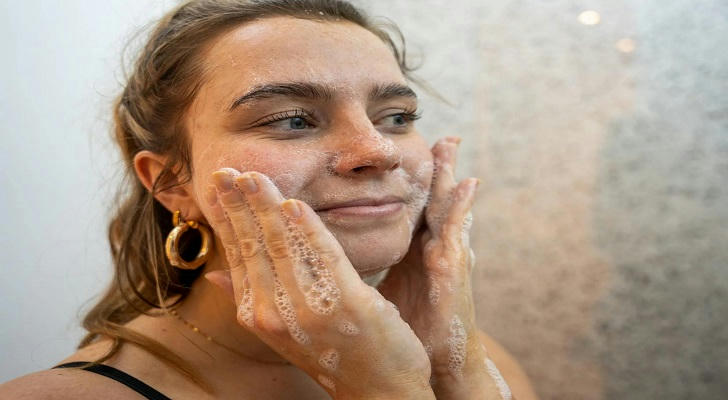Are You Making These Skincare Mistakes?

Have you ever been frustrated with dry, dull skin? Or maybe you break out despite having a consistent skincare routine. Perhaps you've spent a fortune on skincare products, but your skin just won't improve. Do these issues sound familiar?You might be making some common skincare mistakes. Skincare is not just about beauty, it's also a way to care for yourself. Healthy skin can make us radiant and confident. However, many people have misconceptions about skincare, which can lead to suboptimal results or even damage to the skin.This article will take you deep into the common skincare mistakes and provide scientific skincare advice.
Over Cleansing

Did you know that washing your face too often can actually harm your skin? Our skin has a natural barrier that acts like a shield, protecting us from dirt and bacteria. This barrier produces oils to keep our skin moisturized.
Take Emily, for example. She used to wash her face three times a day, thinking that the more she cleansed, the clearer her skin would be. However, her skin started to feel dry and irritated. After consulting a dermatologist, she learned that she was over-cleansing and stripping her skin's natural oils. By reducing her cleansing routine to twice a day and using a gentle cleanser, Emily's skin became less sensitive and less prone to breakouts.
If you wash your face too frequently or use harsh cleansers, you can strip away this protective barrier. Without this barrier, your skin becomes dry, sensitive, and prone to breakouts. It's like removing your skin's armor, leaving it vulnerable.
So, it's important to cleanse your skin gently and not too often. Aim for twice a day. Choose a mild cleanser and use gentle motions when washing. After cleansing, immediately apply a moisturizer to hydrate your skin.
Neglecting Sunscreen

Sunlight gives us warmth, but the ultraviolet (UV) rays in sunlight can be harmful to our skin. They can cause sunburns, premature aging, and even skin cancer. That's why sunscreen is so important!
When choosing a sunscreen, look for the term "broad-spectrum." This means it protects against both types of harmful UV rays. The SPF number on sunscreen indicates how long it can protect your skin from sunburn. For everyday wear, an SPF of 30 is usually sufficient, but for extended outdoor activities, SPF 50+ is recommended.
Many people think they don't need sunscreen on cloudy days or indoors, but that's not true. UV rays can penetrate clouds and glass, so you should wear sunscreen even on cloudy days or indoors. It's also a common misconception that one application of sunscreen lasts all day. Sunscreen needs to be reapplied every couple of hours for ongoing protection.
Not Moisturizing Enough
Moisturizing is like giving your skin a drink of water. Imagine your skin is a desert, if it doesn't get enough water, it becomes dry and rough. So, moisturizing is very important for your skin, it helps keep your skin soft and supple.
Different people have different skin types, so they need different amounts of "water". For example, people with dry skin are like a "desert", they are very prone to dehydration, so they need more "water"; people with oily skin, although oily, also need "water" to balance. People with sensitive skin have more delicate skin, so they should choose gentle "water".
When your skin is well-hydrated, it becomes healthier and less prone to wrinkles. So, moisturizing is not only to make your skin look hydrated, but also to protect your skin.
Ignoring Diet and Lifestyle
Eat well, and your skin will glow. Take Sarah for example. After years of struggling with stubborn acne, she finally decided to consult a dermatologist. The doctor recommended a diet rich in fruits, vegetables, and lean protein, while cutting back on sugary processed foods. Within a few months, Sarah noticed a significant reduction in breakouts and her skin looked brighter and more radiant.

Fruits and vegetables are packed with vitamins, minerals, and antioxidants that can nourish your skin. Aim for at least five servings of fruits and vegetables per day. Try incorporating colorful fruits and vegetables like blueberries, strawberries, spinach, and broccoli into your diet.Lean protein is essential for building and repairing skin cells. Include sources of lean protein like chicken, fish, tofu, and beans in your meals.Foods rich in omega-3 fatty acids, such as salmon, tuna, and walnuts, can help hydrate your skin and reduce inflammation.
Besides eating right, your lifestyle matters too. Staying up late is a big no-no, as it can wreak havoc on your skin. Exercise regularly to keep your body healthy, and your skin will thank you. A happy mood also contributes to healthy skin.
So, if you want healthy skin, you need to take care of it from the inside out. It's not just about skincare products; your diet and lifestyle play a huge role too. By making some simple changes to your daily routine, you can achieve a healthier, more radiant complexion.
In conclusion, skincare is a science that requires constant learning and exploration. Hopefully, this article has given you a deeper understanding of skincare and helped you avoid common pitfalls. Remember, everyone's skin is different, so what works for one person may not work for another. Instead of blindly following trends, take the time to understand your skin and find products and methods that suit you. Establish a skincare routine that works for you and stick with it for the best results. If you have any concerns about your skin, consult a dermatologist or read more professional skincare articles.
